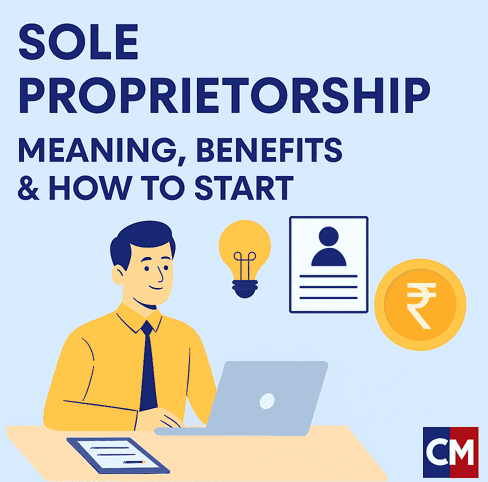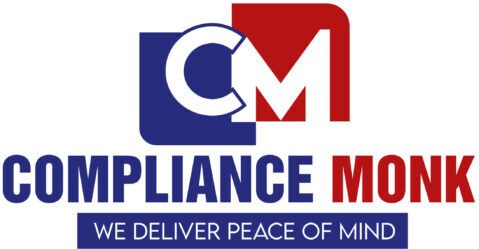
Starting a business on your own? A Sole Proprietorship registration might be the simplest way to begin. It’s the easiest business structure in India and suits freelancers, shop owners, consultants, and solo entrepreneurs looking to start without much hassle.
In this guide, we’ll cover:
Table of Contents
📌 What is a Sole Proprietorship?
A sole proprietorship is a business owned and operated by one person. There’s no separate legal identity between the individual and the business. That means you make the decisions and you enjoy the profits. But it also means you are responsible for any debts, losses, or legal issues.
This type of business isn’t registered with the Ministry of Corporate Affairs (MCA) like an LLP or Pvt. Ltd. Instead, it follows basic local laws and tax rules, which makes it informal but quite common.
💡 Why Choose a Sole Proprietorship?
Here are some reasons why many Indians start their businesses as sole proprietors:
1. Simple Setup, Minimal Paperwork
You don’t need to register with MCA or submit complex forms. Many people begin operating as a sole proprietor simply by offering a service or selling a product.
2. Low Cost to Start
There are no registration fees for the business itself. You might need a few local licenses, but overall, this is the cheapest way to get started.
3. Full Control
As the sole owner, you make all the decisions—about pricing, operations, branding, and hiring. No partners, no shareholders, no board meetings.
4. Easy Tax Filing
Your business income is treated as personal income. There’s no need to file a separate tax return for the business. You simply include it in your ITR, typically under ITR-3 or ITR-4.
5. No Annual Compliance Burden
Unlike LLPs or Pvt. Ltd. companies, you don’t have to stress about annual reports, board resolutions, or MCA filings.
⚠️ Risks You Should Know Sole Proprietorship registration
While it’s beneficial for small businesses, a sole proprietorship has some downsides:
1. Unlimited Personal Liability
If your business takes out a loan or faces a lawsuit, you are personally liable. Your home, savings, or other assets could be at stake.
2. Harder to Raise Funds
Investors and banks prefer businesses that have structured legal support. It’s tougher to obtain significant business loans or attract angel investors as a sole proprietor.
3. No Perpetual Existence
If something happens to you—like death, disability, or retirement—the business essentially ends.
4. Limited Scalability
You can grow, but there’s a natural limit. If you plan to expand quickly, bring in partners, or seek venture capital, this structure might restrict you.
🛠️ How to Start a Sole Proprietorship in India (Step-by-Step)
Here’s a straightforward plan to launch your business:
Step 1: Pick a Name
You can use your personal name or create a brand name (e.g., S.K. Digital Services). If it’s unique, think about filing a trademark.
Step 2: Get a PAN Card & Aadhaar
These are essential for tax filing, opening a business account, and most registrations.
Step 3: Open a Current Bank Account
Banks will require:
- PAN and Aadhaar
- Proof of business (like a Shop Act license, MSME registration, or GST certificate)
Step 4: Apply for Required Licenses
Depending on your business type, you may need:
- Shop & Establishment License (mandatory in most states)
- FSSAI License (for food businesses)
- GST Registration (mandatory if turnover exceeds ₹20 lakh or if selling online)
Step 5: (Optional) Register as MSME
Though not mandatory, registering on the Udyam Portal can give you access to:
- Subsidies
- Government tenders
- Collateral-free loans
Step 6: Keep Track of Income & Expenses
Even as a small business, proper bookkeeping is crucial for tax filing and growth.
🤔 Should You Choose Sole Proprietorship?
It depends on your goals.
Choose sole proprietorship if:
- You’re starting small (like freelance work, an online shop, or consulting)
- You want a fast and easy setup
- You don’t plan to raise outside funding soon
Consider other structures (LLP, OPC, Pvt. Ltd.) if:
- You need investor capital
- You want legal protection
- You’re planning to grow quickly
Get your Sole Proprietorship registration in Just 15 Days with Compliance Monk!
Why Choose Us?
- Speedy Service: We’re faster than your internet connection on a good day.
- Expert Guidance: You chill, we file the paperwork.
Pro Tip: Compliance can vary depending on your industry and location. Want to sleep easy? Let Compliance Monk handle the nitty-gritty while you focus on growing your dream business.
Ready to go from dreamer to doer? Start your sole proprietorship journey today with Compliance Monk! 🚀
Difference Between Proprietorship, Partnership, LLP and Company
| Feature | Proprietorship | Partnership | LLP (Limited Liability Partnership) | Company |
| Ownership | Single owner | Minimum 2 partners; maximum 50 (as per the Act). | Minimum 2 designated partners; no upper limit. | Minimum 2 members (private company); no upper limit for public company. |
| Legal Entity Status | Not a separate legal entity; owner and business are the same. | Not a separate legal entity; partners are collectively responsible. | Separate legal entity distinct from partners. | Separate legal entity distinct from members. |
| Liability | Unlimited; owner personally liable. | Unlimited; partners personally liable. | Limited to the extent of contribution. | Limited to the extent of shareholding. |
| Registration | Not mandatory, but local registrations (e.g., GST) may apply. | Optional but recommended. | Mandatory with the Ministry of Corporate Affairs (MCA). | Mandatory with the MCA. |
| Taxation | Taxed as personal income of the proprietor. | Taxed as the income of the partnership firm. | Taxed as LLP income; no dividend distribution tax. | Taxed as per corporate tax rates; dividend distribution tax applies in certain cases. |
| Compliance Requirements | Minimal compliance. | Low compliance. | Moderate compliance | High compliance |
| Ease of Setup | Very Easy | Fairly easy | Moderate; requires MCA registration. | Complex; requires multiple regulatory approvals. |
| Cost of Setup | Very low. | Low to moderate. | Moderate. | High. |
| Scalability | Limited scalability. | Limited scalability. | Moderate scalability; suitable for professionals and small businesses. | High scalability; ideal for large businesses. |
| Control | Sole control by proprietor. | Shared control among partners. | Shared control among designated partners. | Managed by directors on behalf of shareholders. |
| Perpetual Succession | No; business dissolves with the proprietor’s demise. | No; dissolves with the exit/death of partners unless specified otherwise. | Yes; continues irrespective of partner changes. | Yes; continues irrespective of member changes. |
| Best Suited For | Small businesses, individual entrepreneurs. | Small to medium businesses, family businesses. | Professionals, startups, and small-to-medium businesses. | Large businesses, startups with funding needs. |
FAQ
Is GST registration mandatory for sole proprietors?
Only if your annual turnover goes over ₹20 lakh (₹10 lakh in some states) or if you sell online.
Can I convert my sole proprietorship into Pvt. Ltd. later?
Yes, you can change to a Pvt. Ltd. or LLP if needed, but this requires new registration and transferring assets.
Can a salaried person open a sole proprietorship?
Yes, but check your employment contract. Some companies may restrict side businesses.
How long does sole proprietorship registration take?
Typically, it takes less than 15 working days.
Can I open a business bank account?
Yes, you can open a business bank account with the proprietor’s PAN.
